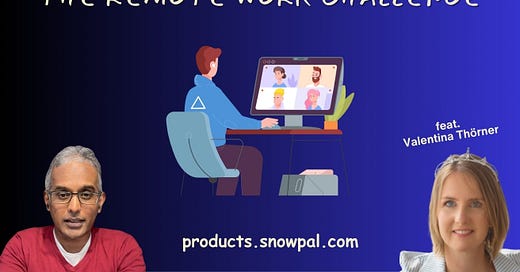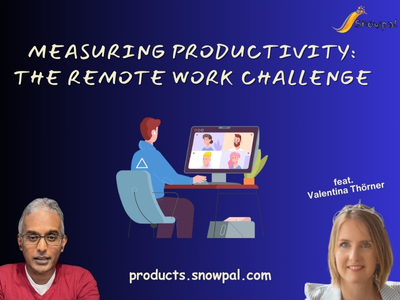Measuring Productivity: The Remote Work Challenge (feat. Valentina Thörner)
Change in work dynamics, especially with AI, is challenging and slow to adopt. Companies are automating jobs while demanding human interaction.
In this episode, Krish Palaniappan and Valentina Thörner discuss the evolving landscape of remote work, the challenges companies face in transitioning back to office environments, and the implications of AI on productivity and work dynamics. Valentina shares her extensive experience in remote operations, highlighting the differences in employee and company perspectives on remote work, productivity measurement, and the future of work in a hybrid model. The conversation delves into the complexities of managing remote teams, the importance of flexibility, and the potential impact of AI on the workforce.
They explore the evolving landscape of work, particularly in the context of automation, AI, and the expectations of the Gen Z workforce. They discuss the contradictions in corporate policies regarding remote work and automation, the cultural shifts brought by Gen Z, and the implications of AI on employment and productivity. The dialogue emphasizes the need for flexibility in work arrangements and the challenges of adapting to new technologies while maintaining a healthy work-life balance.
Krish and Valentina explore the evolving landscape of the workforce, particularly in light of AI advancements. They discuss how individuals entering the job market should approach their career choices, emphasizing the importance of asking good questions and finding passion in their work. Valentina shares insights on team dynamics in the age of AI, highlighting the necessity of human connection and the challenges posed by societal divisions. The conversation concludes with reflections on the value of human interaction over AI-generated responses, underscoring the need for intentional relationships in both personal and professional contexts.
Takeaways
Valentina has extensive experience in remote operations, predating the pandemic.
The narrative around remote work often centers on employee convenience, but companies have different concerns.
Productivity in remote work is difficult to measure and often misunderstood by management.
Employees who are productive at home are often productive in the office as well.
Management requires more effort to connect with remote employees compared to in-office workers.
The return to office mandates may not necessarily lead to increased productivity.
AI has the potential to simplify work but requires skilled prompting to be effective.
The future of work may see a shift towards hybrid models as employees self-select their work environments.
Companies insisting on return to office may lose diversity in their teams.
Change in work dynamics, especially with AI, is challenging and slow to adopt. Companies are automating jobs while demanding human interaction.
Gen Z seeks flexibility and is resistant to traditional work hours.
The rise of AI may lead to fewer jobs but different work dynamics.
People value remote work over office perks, even at a pay cut.
Cultural differences impact work expectations and hours.
In Europe, work hours are legally limited, promoting work-life balance.
AI's effectiveness is limited by its training data and inherent biases.
Productivity can decrease with longer work hours beyond a threshold.
The future of work will involve gradual changes, not immediate overhauls.
Navigating workplace changes requires understanding human behavior. Asking good questions is crucial in today's workforce.
Finding a passion can lead to unexpected career paths.
No industry is completely safe from change.
Team composition must adapt to new technologies.
Human connection is essential in a tech-driven world.
Diversity in teams leads to better product outcomes.
Intentionality in relationships is key to growth.
AI can enhance but not replace human interaction.
Conflict is a natural part of relationships and growth.
Navigating societal divisions requires awareness and empathy.
Chapters
00:00 Introduction to Remote Work Dynamics
02:46 The Shift Back to Office: Employee vs. Company Perspectives
05:45 Productivity and Management in Remote Work
08:49 The Myth of Office Productivity
12:03 Measuring Productivity: Challenges and Solutions
14:56 The Role of AI in Remote Work
17:52 Future of Work: Hybrid Models and Employee Preferences
30:56 The Automation Dilemma
32:46 Understanding Gen Z's Work Culture
34:51 The Impact of AI on Employment
36:43 Work-Life Balance and Flexibility
39:36 Cultural Differences in Work Hours
44:08 The Future of Work and AI
52:01 Navigating Change in the Workplace
58:17 Navigating Career Choices in a Changing Workforce
01:00:07 The Importance of Asking Good Questions
01:02:09 Finding Your Passion in an Uncertain Job Market
01:04:51 Team Composition in the Age of AI
01:07:21 The Human Element in Software Development
01:09:35 Addressing Division and Bias in Tech
01:12:55 The Need for Intentional Human Connection
01:17:52 The Value of Human Interaction Over AI
Podcast
(For video version, go to Spotify, Apple, or YouTube)
Transcript
Valentina Thörner
Snowpal Products
Backends as Services on AWS Marketplace
Mobile Apps on App Store and Play Store
Web App
Education Platform for Learners and Course Creators




